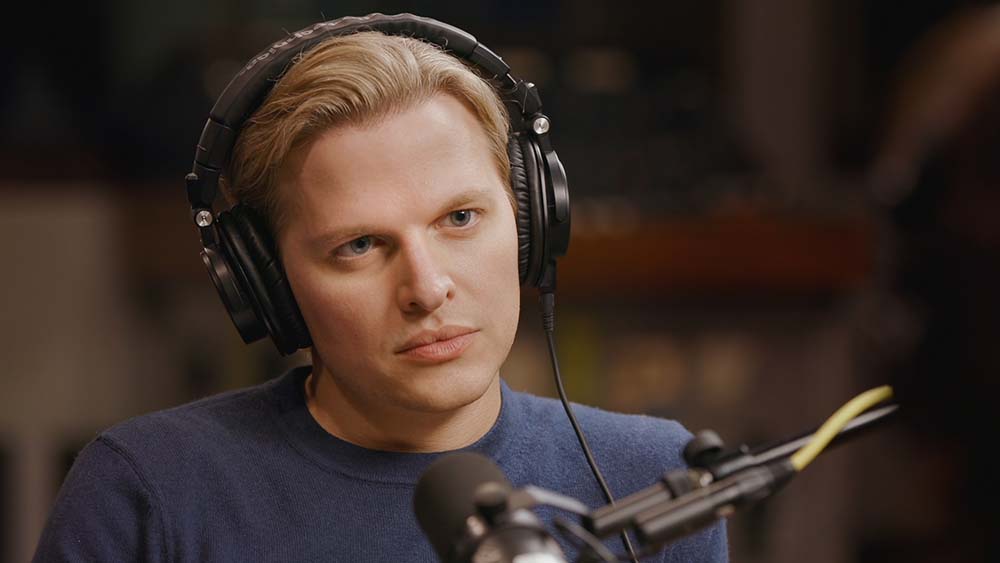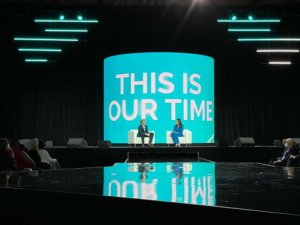
Journalist Ronan Farrow, shown here in the HBO documentary based on his bestselling book Catch and Kill, told the CL22 audience Monday that events can “change the world for the better.” (HBO)
A democratic society relies on its citizens having accurate information in order to make good decisions, but even before the pandemic, trust in the media was rapidly deteriorating, said journalist Ronan Farrow, who delivered the opening keynote on the Main Stage Monday. Then the pandemic created a “perfect laboratory experiment in disinformation,” said Farrow, an author and staff writer for The New Yorker, whose work exposing the criminal misconduct of powerful figures including movie producer Harvey Weinstein and former CBS executive Leslie Moonves, earned him the Pulitzer Prize, among other honors.
“Suddenly people were spending more time at home, alone in the bubble of information or misinformation that the [social media ]algorithms curate for you. That becomes the only lens through which you view the outside world.” As a result, “we live in two universes that never meet,” Farrow said. “The online ecosystem casts everything in a crucible of partisanship,” one which feeds on extremism and misinformation, he said. “It’s an experiment with deadly consequences , where anti-vaccine and anti-mask sentiment are still being stoked — and they are still killing people.”
And this, Farrow told the audience of meeting professionals, “is where you come in.”
In the absence of town squares and other spaces where people share information, substantive events can fill in the gap and “change the world for the better,” he said. Farrow listed notable examples of events with life-changing impact, including the 20th International AIDS conference, held in 2014 in Melbourne, Australia, which changed global approaches to HIV AIDS research and treatment. More recently, COP26, the United Nations’ Climate Change conference in Glasgow, Scotland, “helped to mobilize billions of dollars and commitments to tackling climate change.” Recent conferences like COP26 “have had to adopt hybrid in-person and virtual approaches,” he said. “I feel it’s more important than ever that they happen, in this time of challenge when shared space and common ground is so precious.”

After his Main Stage keynote Monday, Ronan Farrow sat down for an interview with mediator Holly Ransom.
Diplomacy is hard, added Farrow, who recently completed a Ph.D. in political science at Oxford University and previously served as a State Department official in Afghanistan and Pakistan. “Any diplomat will tell you that in order to do it right, you’ve got to be face to face at a certain point.”
“You need to keep reinventing yourselves and adapting and coming up with new ways to bring people together,” he said. “I really think [that events] can also be part of what we all need to cut through some of the biggest obstacles we all face.”
Farrow, who was added to the conference agenda to replace actor and activist Dan Levy, who canceled due to the extension of a previous contractual obligation, was introduced and interviewed onstage by event emcee Holly Ransom. Here are some excerpts from their conversation:
Ransom: The business events industry, which in many ways is a platform for storytelling and connection in the current media landscape … is noisy and cluttered. Do you have any advice on how to cut through with your messaging and your ideas that you’re trying to convey?
Farrow: There is a whole swath of leads that I get that I know would be worthwhile if exposed. Part of the basis on which I pick and choose is: How important is this? And how big is this? Is this going to trigger an important conversation that affects a larger number of people? … I look for fact patterns and leads that do have an explosive quality. And I think for anyone in the audience whose organizations want to cut through the noise, they should focus on something important.
Ransom: What are the challenges that you think leaders in this room need to be really mindful of?
Farrow: It’s going be a time of chaos for a while. I’m shocked that we’re here — we’re doing it — you’re all here in your masks and we’re keeping life going. That’s going to be the spirit of geopolitics for the next year or more as well — we’re going be toughing it out. It’s going to be challenging for all of our industries, but we’re going to push through and it is going to get better. And I think in the reinvention that is required for your industries, for my industry, you’re going to see innovation that will make things even better than where we were before the pandemic.
Ransom: What would you like to encourage this room full of leaders to do?
Farrow: What we’ve said about mission, and from what I see from all the looks on your faces, you connect about mission — that’s the center of it. If you direct the immense power and resourcing in this room towards making the world a better place … and whatever the specific, narrow problem in your industry that’s connected to the event, zero in on that. Set the mission on solving those problems. I sense, even from this brief and slightly distanced and masked interaction, that there’s energy to sustain that here in this room — and that’s exciting to me.
Barbara Palmer is deputy editor of Convene.
